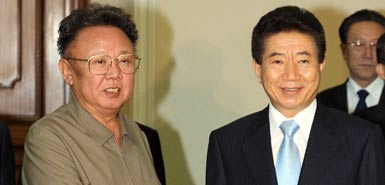Korean hopes rise after thaw in Kim
Jog Il's stance

Read the Urban Dirt blog on the summit
Their countries may technically still be at war, but that did not stop the leader of North Korea from inviting his South Korean counterpart to lunch.
It might have been the moment when two bitter enemies set aside their differences to end almost 60 years of hostility. Instead, it will be remembered as the day when President Roh of South Korea deferred to his advisers, and was told it was time to go home.
By declining the invitation, Mr Roh risked upsetting his host, President Kim Jong Il, at what was only the second meeting between leaders of their two countries.
But advisers to the two leaders were confident last night that today’s joint declaration at the end of the historic summit will mark a turning point in the difficult relations between the two neighbours.
The declaration is expected to include plans for greater economic co-operation and a “first draft” peace deal. The latter, said optimists in the South Korean Government, would represent a tentative step towards ending the war that has brought nearly six decades of division and acrimony to the peninsula.
No longer walking awkwardly, and visibly engaged in the proceedings, Mr Kim was much more animated than during the first session on Tuesday. It was too soon to describe the scene as cordial, observers said, but the atmosphere was less frosty than it was on Tuesday.
As if responding to speculation that his appearance on the previous day had revealed his poor physical shape, Mr Kim let slip an unprecedented public allusion to his health. “The President came, and I don’t need to stay at home lazing around when I’m not even a patient,” he said.
The two men discussed the recent floods that devastated North Korea, and touched on the sensitive issue of denuclearisation that remains the subject of wider diplomatic tussle.
While the two Korean leaders were chatting, China reported a breakthrough in the six-party negotiations over Pyongyang’s nuclear programme. Under a deal reached between China, the two Koreas, Japan, Russia and the US, the communist regime will disable the three main nuclear facilities at its Yongbyon site and come clean over all such technology by the end of the year. Washington hailed the agreement as an important step in the denuclearisation of the Korean peninsula.
In Pyongyang, the Dear Leader was in celebratory mood, and sprung the lunch offer on his counterpart. Caught off guard, Mr Roh did not respond immediately to the invitation, which would have meant staying an extra day in Pyongyang.
After a hasty consultation with his political and protocol advisers, Mr Roh is understood to have turned the offer down. But as the two men emerged from their second session, Mr Kim had an alternative take on the proposed lunch date. “As we had enough dialogue, we don’t need to extend the summit,” he said.
Seasoned North Korea watchers have struggled to make sense of the exchange. Many believe Mr Kim’s offer was an attempt to catch his counterpart off guard, just as he had seven years ago when he greeted Kim Dae Jung, the then South Korean President, at Pyongyang airport.
Mr Roh has staked his legacy on the success of this summit, and could easily have presented the lunch offer as evidence of détente with the North.
Equally, Mr Roh must return today to Seoul, where many believe he has already gone too far down the road of appeasement. Appearing to be at Mr Kim’s beck and call by accepting the change in plans could have reinforced that impression. Yesterday’s schedule included Mr Roh’s attendance at North Korea’s notorious “mass games”.
The outdoor performances by thousands of young dancers, which involve months of drills and rehearsal, are criticised regularly by human rights activists as being exploitative of children. The attendance of Mr Roh, already under heavy domestic fire for his perceived kowtowing to Pyongyang, was one of the most controversial features of the summit.

Thanks but no thanks Kim Jong Il
“It’ll be good to push your schedule, take your time and sit down, loosen your belt and have lunch . . . Let’s delay your schedule by a day . . . How about you return in the morning [tomorrow]?”
Roh Moo Hyun
“There are two places which are more powerful than me. I think I have to discuss it with Security and Protocol.”
Kim
“The president can’t make the decision? All that’s needed is for the president to decide.”
Roh
“I decide on the big things. I can’t decide on the small things.” South Korean reporters’ transcript of conversation